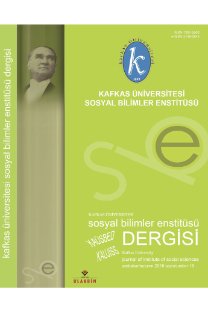AYDINLANMA İDEOLOJİSİNİN DİLE YANSIMALARI J. C. GOTTSCHED VE J. C. ADELUNG'UN DİL ÜZERİNE DÜŞÜNCELERİ
Bu çalışmada Aydınlanma İdeolojisinin dil üzerindeki etkisi ve dildeki yansımaları ele alınmaktadır. Bu anlamda Aydınlanma İdeolojisinin Almanya'daki en önemli temsilcilerinden J. C. Gottsched ve J. C. Adelung'un dil üzerine düşünceleri de incelenmektedir. Düşünce alanında köklü değişimlere yol açmış olan Aydınlanma ideolojisi Avrupa'yı yeni bir döneme taşımıştır. 17. yüzyıl sonlarından başlayarak 19. yüzyılın başlarına kadar uzun bir dönemi etkilemiş olan Aydınlanma ideolojisi insana ait tek ve en önemli gücün akıl olduğu düşüncesine dayanmış ve var olan yaşam biçimini ve kültür yapısını değiştirmiştir. Düşünerek yazmak ve her sözcüğe anlam olarak tam karşılığını vermek Aydınlanma ideolojisinin dil anlayışını bir ölçüde de olsa ortaya koymaktadır. İnsan aklının bir ürünü olan düşünce ve bunun sonucu ortaya çıkan kültürel değerlerin saf ve anlaşılır olması temel hedeftir. Dönemin yazı stili de bu anlamda değer kazanmıştır. Bu anlayış Aydınlanma döneminin bilimsel yazılarını derinden etkilemiştir. Şeffaflığı ve anlaşılabilir olmayı kurumsallaştırmaya yönelik dönemin dil anlayışı, örtülü dil kullanımından ve deyimlerden olabildiğince kaçınmayı da bu konuyla ilgili düşüncesinin merkezine oturtmuştur. Dilde temel doğruluk ideolojisi Aydınlanma döneminin dil felsefesinin öncelikli hedeflerinden biridir. Temel bir doğrunun olması gerekliliği düşüncesi genel olarak Aydınlanma ideologları tarafından her zaman istenmiş ve teşvik edilmiştir. Gottsched ve Adelung dil ile ilgili bu düşüncenin Almanya'daki önde gelen savunucularıdır.
The Impact of Enlightenment Ideology upon Language J.C. Gottsched and J.C. Adelung Thoughts About Language
In this study, the impact and the outcomes of the Enlightenment Ideology upon language will be analyzed. In this sense, the remarkable ideas of the most significant persons in this field, in Germany, J.C. Gottsched and J.C. Adelung, thoughts about language will be discussed. The Enlightenment Ideology leading to radical changes in the field of philosophy, made Europe experience a new period. Influencing a long period of time, from the end of the 17th century to the beginning of the 19th century, this ideology was based on the fact that the basic and the most important issue related to human beings was the mind, so it changed the living style and the cultural structure of societies. According to the norms of this ideology, thinking was the basic element in writing and one should attribute, particularly the literal meanings, to words. The ultimate principle in accordance with this ideology was that the ability to think, the product of human mind, and the cultural values it brought about, should be simple and clear. Thus, the style of writing experienced a significant change in the Enlightenment period. This understanding efficiently influenced the academic writings of the era. The basic characteristic of this philosophy was to create a straightforward and an understandable language without any additional meanings or idioms. The transparency in language was one of the most notable elements in the philosophy of language of this period, so this philosophy has been supported by those accepting the Enlightenment Ideology. In this respect, Gottsched and Adelung are the leading philosophers of this understanding in Germany.
___
ADELUNG, J. C. 1782: Umst¨andliches Lehrgeb¨aude der Deutschen Sprache, Bd. I, Leipzig.
DROSDOWSKI, G. 1986: Sprachnormen in der Diskussion. Walter de Gruyter Verlag: Berlin.
EGGERS, H. 1977: Deutsche Sprachgeschichte IV. Das Neuhochdeutsche. Veröffentlicht im Rowohlt Verlag: Reinbek bei Hamburg.
FRICKE, G.-SCHREIBER, M. 1979: Geschichte der deutschen Literatur. 18. Auflage. Ferdinand Schöningh Verlag: Paderborn.
GERO von W. 1976: Deutsches Dichterlexikon. Biographisch-bibliographisches Handwörterbuch zur deutschen Literaturgeschichte. Zweite erweiterde Auflage. Alfred Kröner Verlag: Stuttgart.
GOTTSCHED, J. C. 1752: Grundlegung einer Deutschen Sprachkunst nach den Mustern der besten Schriftsteller. Verlegt: Bernhard Christoph Breitkopt: Leipzig.
LORCHNER, G. Zur sprachgeschichtlichen Bedutsamkeit der Auseinandersetzung zwischen Wieland und Adelung. In: Sprache und Kulturentwicklung im Blickfeld der deutschen Aufklärung. Der Beitrag Johann Christoph Adelungs, hrsg. v. W. Bahner.
ORTHBANDT, E. 1980: Geschichte der grossen Philosophen. Werner Dausien Verlag: Hanau.
POLENZ, P. V. 1972: Geschichte der deutschen Sprache. Walter de Gruyter Verlag: Berlin.
STAMMLER, W. 1957: Deutsche Philologie im Aufriß, 2. Überarbeitete Auflage, unter Mitarbeiter zahlreicher Fachgelehrter Band I Erich Schmidt Verlag Berlin.
WELLS, C. J. 1990: Deutsch:eine Sprachgeschichte bis 1945/ Aus dem Engl. Von Rainhild Wells. Max Niemeyer Verlag: Tübingen.
